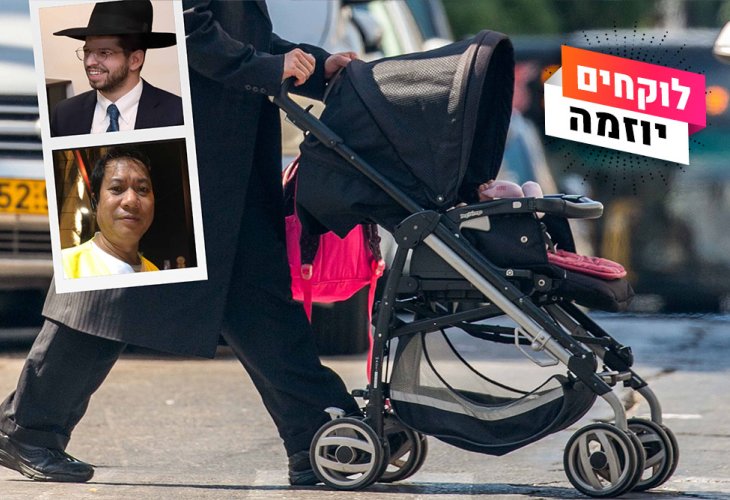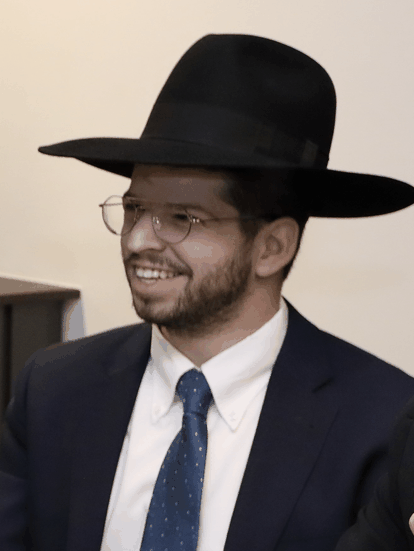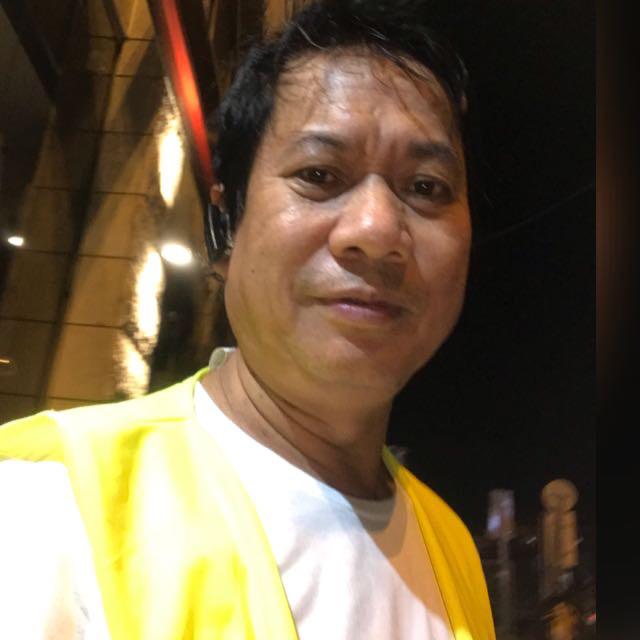The Non-Jew Who Moves Hundreds of Strollers on Shabbat: "I Love the Jews, I Want to Help Them"
Robin Lebana, a Filipino caretaker for the elderly, spends every Friday night transporting strollers on Jabotinsky Street to resolve an issue with the eruv. "This is the most effective solution we've found, allowing us to visit our parents without halachic issues," explains Rabbi Elchanan Aaron, the initiator of this unique effort.
 (Illustrative Photo: Flash 90)
(Illustrative Photo: Flash 90)If you walk down Jabotinsky Street on the border of Bnei Brak during one of the Shabbat nights, you might stop in astonishment. The scene is peculiar and inexplicable: a muscular, strong Filipino stands in the middle of the street, wearing a reflective vest, and every time a family approaches with a stroller, he leaps towards them, takes the stroller, and carries it to the other side of the road.
But for the locals, this is not surprising. The Filipino, named Robin Lebana, has been there every Shabbat for the past months after being called upon to solve the eruv issue that the residents have been dealing with for years.
An Issue with a Solution
"This initiative was born from the need of people living in Kiryat Herzog who wish to have their Friday night meal with their parents residing in Bnei Brak," explains Rabbi Elchanan Aaron, the person behind this interesting initiative. "There are Shabbatot when hundreds of such families exist, and on their way, they must cross Jabotinsky Street with strollers – both ways. This presents a significant challenge as this area is quite problematic in terms of the eruv."
Rabbi Elchanan explains that in the past, there was a biblical prohibition against carrying on this particular road, but in recent years, since the opening of Im Moshavot Road, the severity of the prohibition has decreased to rabbinic, yet it is still impossible to establish an eruv there for various reasons, leading to a significant problem.
 Rabbi Elchanan Aaron
Rabbi Elchanan AaronHow did people cope until today?
"Some people initially avoided crossing Jabotinsky Street and would go over the Pardes Katz bridge, adding another 40 minutes to their walk. But most families just came to the road and waited for a non-Jew – a foreign worker or someone living in the area – to pass by, and then they would ask him to move the stroller. Of course, this was not simple at all – not every non-Jew passed by, and even when one did, he might not have been willing to help, or he did not understand what was being asked of him, while people had trouble making specific requests due to Shabbat laws."
What broke the camel’s back was the last seventh day of Pesach, which fell on Shabbat. "The meal ended very late at night, due to daylight saving," says Rabbi Elchanan, "and when people wanted to return to Kiryat Herzog, they came to the road and for a long time, no non-Jew passed by to carry the strollers. I was there with my family, and it was frustrating. The children were very tired, and we all wanted to go home but found no way. Eventually, we relied on a permissible opinion to have children move the stroller, and that’s what we did. I returned from the event feeling very dissatisfied. I felt that something had to be done."
Honoring Parents
Rabbi Elchanan's idea was simple – hire a non-Jew to stand for several hours every Friday night on the street to move strollers from one side of the road to the other – from where the Bnei Brak eruv ends to where the new eruv begins.
He says it was crucial to first consult with rabbis to hear the precise halachic response that suits such a case. "All the rabbis I consulted with told me this is a very important thing, and that the solution I am proposing is completely legitimate from the outset. Afterwards, I managed to find a nice non-Jew who regularly cooperates with us – in the summer, he stands from 10:30 PM to 1:30 AM, and in the winter from 9:00 PM to midnight. He stands there with a reflective vest, so everyone knows he is responsible, and that is how he moves the strollers from side to side."
Do you also use him to carry other items?
"Based on my inquiry, it is not so simple to use the non-Jew's services for carrying other items, and everyone should consult their own rabbis about this. The stroller is different as it is a minor necessity, and there is another interesting point – the stroller is brought for the purpose of honoring one's parents, and since it is for the need of a mitzvah, it is permitted from the outset halachically. Moreover, there is a significant advantage since it is a non-Jew who knows what is expected of him, so there is no need to approach him and ask. This saves people the trouble of filtering their words and knowing exactly how to request from a non-Jew on Shabbat."
Like Part of the Family
As mentioned, the one who took on this important role is Robin Lebana, who tells us: "Aaron approached me and told me about the idea. I have been in Israel for 17 years, but I have never heard of such a role. After he explained a little more, I understood and told him I needed to consult with the family I work for. I care for an elderly person and cannot leave him alone, but at the hours they asked me to come, he is asleep. The family gave me their approval, so I come every Shabbat."
Lebana notes that the job is harder than it initially seemed. "Sometimes there are Shabbatot when it rains or is very cold, and I cannot avoid the duty because I know people are relying on me. I truly do it to help them."
 Robin Lebana, the Filipino
Robin Lebana, the Filipino You are not Jewish. Why is it so important for you to help the Jews?
"I told you I have been in Israel for 17 years; I live with Jews, and they are my family. I haven't been able to return to the Philippines for several years due to COVID-19 and haven't seen my family who awaits me there. To me, the Jews are like part of the family."
Rabbi Elchanan says that the feedback on the initiative is very enthusiastic. "There are people who told me they hadn't visited their parents for seven or eight years because they didn't want to take the long path and feared there wouldn't be anyone to move their strollers on the short path. Some said they added a lot of Shabbat joy to their parents by starting to visit, and one person shared that his child broke a leg, and the only way to get him to a medical center was when he sat in a stroller. Thanks to the non-Jew, he was able to do it. From Shabbat to Shabbat, we see how effective this solution is, and we intend to continue it as long as we can financially sustain it, given that we rely entirely on donations that allow us to pay the non-Jew a nominal fee."
Do you also know of a unique initiative or an inspiring activity? You are welcome to write to us in the "Taking Initiative" section

